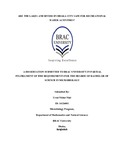| dc.contributor.advisor | Siddiqee, Mahbubul Hasan | |
| dc.contributor.author | Nini, Urmi Nishat | |
| dc.date.accessioned | 2018-09-17T05:07:15Z | |
| dc.date.available | 2018-09-17T05:07:15Z | |
| dc.date.copyright | 2018 | |
| dc.date.issued | 2018-07 | |
| dc.identifier.other | ID 14126001 | |
| dc.identifier.uri | http://hdl.handle.net/10361/10629 | |
| dc.description | This thesis is submitted in partial fulfilment of the requirements for the degree of Bachelor of Science in Biotechnology, 2018. | en_US |
| dc.description | Cataloged from PDF version of thesis. | |
| dc.description | Includes bibliographical references (page 41-44). | |
| dc.description.abstract | Unplanned urbanization can lead to contamination of the surface waters with industrial and fecal pollutants. Fecal organisms can cause a number of diseases to humans in case of skin contact or accidental ingestion. The objective of this study was to determine the microbiological standards of Hatirjheel Lake and Buriganga River which are the two potential spots for recreational water activities. A total of 40 samples were tested; 30 from Hatrijheel and 10 from Buriganga. The samples were collected in an asceptic way from different points of Lake and River within duration of three months. The samples were processed and analyzed for quantification of fecal and total coliform. While at the same time, the samples were also processed for detection of Shigella spp. And E.coliO157:H7 after primary and secondary enrichment steps. Virulence genes eaeA and IpaH were checked for E.coliO157:H7 and Shigella spp. respectively. While 100% of the samples from both water-bodies were positive for coliforms (maximum count of 9x104cfu./mL) whereas 43.3% and 80% of the samples were positive for fecal coliforms from Hatirjheel (with a maximum count of 3.2x 103 cfu/mL) and Burigangal (with a maximum count of 6.2 x103 cfu/mL) respectively. The study reveals that both Hatirjheel Lake and Buriganga River can be endemically contaminated with fecal bacteria. Hence, strong precautions should be taken in case of direct contact with these waters while strong measures need to be taken to control pollution of these water-bodies by fecal organisms. | en_US |
| dc.description.statementofresponsibility | Urmi Nishat Nini | |
| dc.format.extent | 56 pages | |
| dc.language.iso | en | en_US |
| dc.publisher | BRAC Univeristy | en_US |
| dc.rights | BRAC University theses are protected by copyright. They may be viewed from this source for any purpose, but reproduction or distribution in any format is prohibited without written permission. | |
| dc.subject | River water | en_US |
| dc.subject.lcsh | Water--Pollution--Bangladesh--Dhaka Division. | |
| dc.title | Are the lakes and rivers in Dhaka city safe for recreational water activities? | en_US |
| dc.type | Thesis | en_US |
| dc.contributor.department | Department of Mathematics and Natural Sciences, BRAC University | |
| dc.description.degree | B. Biotechnology | |

